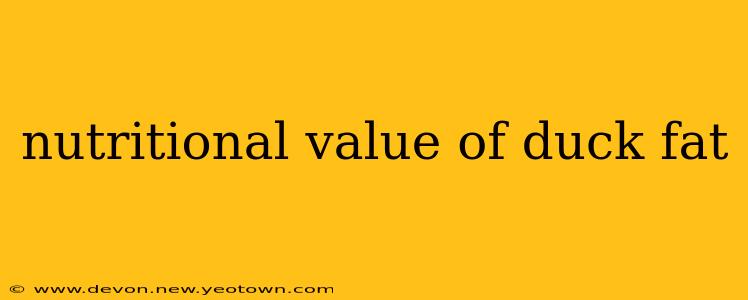Duck fat. The very words conjure images of crispy-skinned potatoes, richly flavored confits, and the comforting aroma of a perfectly roasted bird. But beyond its culinary prowess, duck fat boasts a surprisingly impressive nutritional profile that deserves a closer look. This isn't your grandma's artery-clogging fat; it's a nuanced ingredient with benefits that might surprise you.
Let's embark on a journey to uncover the truth behind this often-misunderstood fat, dispelling myths and exploring its place in a balanced diet.
What is Duck Fat?
Duck fat is the fat rendered from a duck's skin and subcutaneous tissues. Unlike many other animal fats, duck fat is remarkably rich in monounsaturated fatty acids (MUFA), specifically oleic acid – the same healthy fat found abundantly in olive oil. This high MUFA content contributes to its desirable flavor and its relatively stable nature, making it ideal for high-heat cooking without breaking down easily.
Is Duck Fat Healthy?
This is the million-dollar question, and the answer, like most things nutritional, is nuanced. While it's higher in saturated fat than olive oil, it's crucial to remember that not all saturated fats are created equal. Duck fat contains a unique blend of fatty acids, including palmitic, stearic, and oleic acids. Stearic acid, in particular, is less likely to raise cholesterol levels than other saturated fats.
Moreover, the high smoke point of duck fat (around 420°F or 215°C) makes it suitable for various cooking methods, from roasting and sautéing to deep frying. This allows you to enjoy its flavor without the potentially harmful compounds produced by fats that break down at lower temperatures.
How Does Duck Fat Compare to Other Fats?
This is a common comparison, and it's important to understand the distinctions. Let's look at some key players:
- Olive Oil: While olive oil is lauded for its monounsaturated fats, duck fat offers a more intense flavor profile and a higher smoke point, making it preferable for certain cooking techniques.
- Butter: Butter contains a higher proportion of saturated fat compared to duck fat, and its lower smoke point makes it less suitable for high-heat cooking.
- Lard: While both duck fat and lard are rendered animal fats, duck fat typically has a more desirable flavor and a higher MUFA content.
What are the Health Benefits of Duck Fat?
While moderation is key with any fat, duck fat does offer some potential benefits:
- Rich in Vitamin E: Duck fat contains a decent amount of vitamin E, a potent antioxidant.
- Source of Omega-3 and Omega-6 Fatty Acids: Although present in smaller amounts, these essential fatty acids are still beneficial for heart health and overall well-being.
- Flavor Enhancement: Let's not forget the undeniable culinary benefits! The rich flavor of duck fat enhances the taste of many dishes.
Is Duck Fat Good for Weight Loss?
This is a complex issue. While duck fat is calorie-dense (around 9 calories per gram, similar to other fats), its rich flavor allows for smaller portion sizes, potentially helping with overall calorie intake. However, it's not a magic bullet for weight loss and should be incorporated as part of a balanced diet and exercise regimen.
What are the Downsides of Duck Fat?
Like any high-fat food, duck fat should be consumed in moderation. Excessive consumption can contribute to weight gain and potentially negatively impact cholesterol levels for some individuals. Individuals with heart conditions or high cholesterol should consult their doctor before incorporating large amounts of duck fat into their diet.
Conclusion:
Duck fat, with its unique nutritional profile and rich flavor, deserves its place in a balanced diet. It's not a health food in the sense of being a "superfood," but when used responsibly as part of a healthy eating plan, it can contribute to delicious and satisfying meals. Remember moderation is key, and consulting with a healthcare professional is always advisable when making significant dietary changes.

